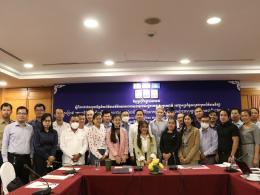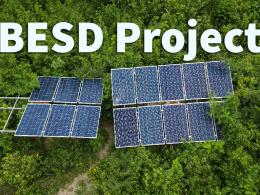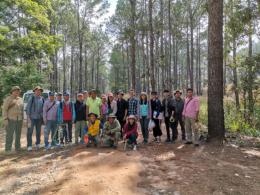Piloting Energy Efficiency and Solar Micro Grids for Cambodia’s Clean Energy Future
Background
Clean energy has been recognized to play an important role in Cambodia’s sustainable energy transition. This demonstration project focuses on two key areas of clean energy: energy efficiency (EE) in buildings and solar microgrids for rural electrification. Energy efficiency in buildings can contribute to slow down the electricity demand growth in the country and, thus, reduce greenhouse gas emissions. Solar microgrids for electrifying remote villages is a carbon-neutral solution and address the lack of cost-effective and feasible electrification options for 237 remaining remote communities without access to grid electricity. The overall objective is to showcase the feasibility of energy efficiency and building energy management in the government buildings and pilot sustainable operation models of solar microgrid in one remote villages. The outcomes will be used to develop sector-specific recommendations for the Royal Government of Cambodia (RGC) to implement.
Under the energy efficiency component, the project will conduct walk-through energy audits in public buildings to identify energy and cost savings and develop building energy management guidelines. The activities will be in line with the government’s National Energy Efficiency Policy which is anticipated to be approved in early 2021. Technical support for the implementation of energy efficiency measures and management, and the development of energy efficiency procurement guidelines will ensure the replication of the pilot activities. The solar component’s principal activities are developing an innovative operation models for solar microgrids, install solar microgrid in one remote village, and test and operate them. The lessons learned from the operation will help to suggest a feasible solution for affordable and reliable electricity supply for remaining villages without access to grid electricity.
Overall Objective
The proposed project aims to addresses the issue of carbon emissions from increasing energy consumption growth in Cambodia
Specific Objectives
1. promote of energy efficiency and conservation in public buildings; and
2. pilot a new clean energy model through solar DC or AC microgrid for electrification in remote areas of the country.
Approach
The demonstration of energy efficiency in existing government buildings will show the involved organizations how energy saving opportunities can be realized through piloting in 10 government buildings. Walk-though audits and the installation of a smart energy monitoring system will empower the building owners, managers, and MME with knowledge on energy use and wastage in the buildings. MME staff will be actively involved in the process and, thus, build up capacity in this field. The
project aims to develop energy efficiency procurement guidelines and a localized Guidebook on Building Energy Management (BEM). Capacity-building measures are foreseen to train government officials and building facility managers in BEM. Finally, a BEM action plan for public and commercial buildings will be developed based on the lessons learned by the pilot.
Outputs and Key Activities
| Result | Key Activities |
|---|---|
|
|
|
|
|
|
|
|
|
|
|
|
Knowledge Products
• Four promotional video clips that document the project progress and success stories and disseminate theses clips through social media on MME’s and other partner’s websites and Facebook pages • training materials, conducting Training-of-Trainers and pilot training on Building Energy Management • Energy Efficiency procurement guidelines that can be used by government agencies or other commercial building owners • MME’s website and Facebook page
| Timeframe | Total Budget | Partners | Location |
|---|---|---|---|
|
2 years |
USD 296,065 (Total) CCCA USD 249,865 |
N/A |
Phnom Penh (Energy Efficiency), Province (Solar Micro Grid) |






